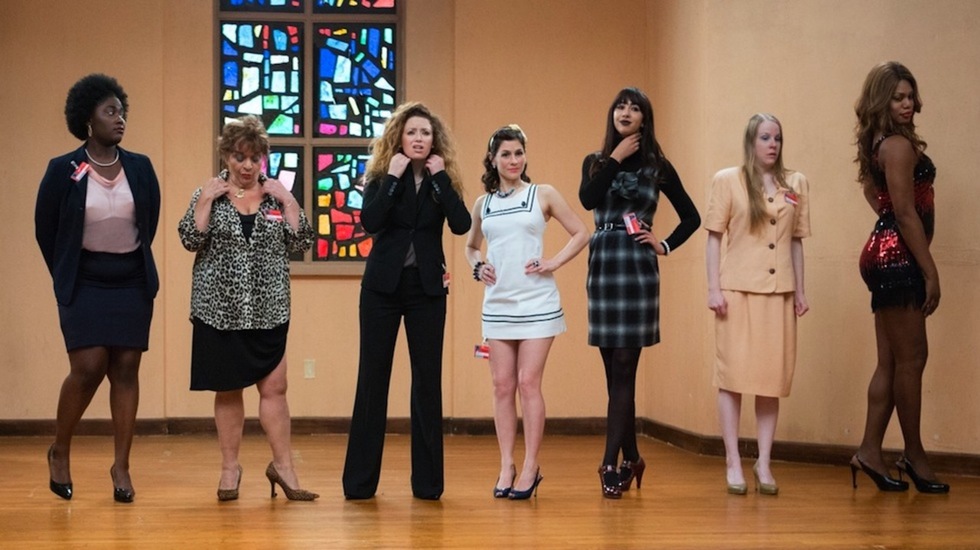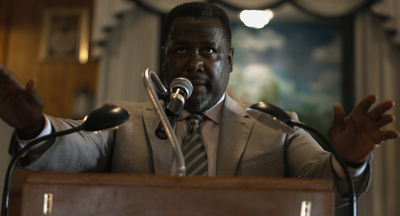
BY EMMA PEARSE |
Before 'Orange is the New Black,' There Was Australia's 'Prisoner'
As OITNB returns to Netflix, let's look back at its even-more-brutal '80s Aussie women's prison drama predecessor.

Over on Netflix, today will bring more of what one character calls, in the trailer, “like, next level crazy,” at the minimum-security women’s prison. The show is a hit, not the least because of its anomalous realism for television—it is, as Emily Nussbaum put it in The New Yorker “very clear about how much she [Piper, the main character] benefits from her demographic rarity.” And it brings together all types of women who we’re more used to getting as token characters: the crazy-eyed, the lesbians, the transgender, the mean, the delusional, the twisted princesses—locked up together, victims of an unjust world and of themselves.
And while the show is a revelation, it’s not the first of its kind. Bust magazine did an excellent rundown of the women-in-prison genre last year. One show that is missing is the Australian '80s hit drama, Prisoner, which, as an Aussie, I grew up watching with my addicted best friend. It ran late at night, rerun after rerun through the '90s after playing through the early '80s in Australia, Britain and the US (it was called Prisoner: Cell Block H over here, and in Canada, classily, Caged Women).
Wentworth Detention Center was not minimum security and most of these women were rougher (rough as guts, we’d say down there) than the OITNB characters—it was the '80s, there was little censorship, which in combination with the loose Australian slang makes for some eye-raising dialogue. “You really are the most uncouth slut, Doyle,” one of the guards calls an inmate in this priceless YouTube collage. Behold the mullets, the dungarees, the dirty yellow undershirts. And the pore-stretching grimaces amid decidedly unfeminine riots and meltdowns.

It was humorous and tragic. There was very little flattering about these women so of course we wanted to spend our nights with them: nothing like the tanned, short-shorts-wearing sweethearts on Paradise Beach that was our after-school TV must see. We might’ve coveted the sunny days and surfing, rippling objects of desire (the blokes) but the women on Prisoner were infinitely more engrossing and entertaining and gave us a lot more to gossip about when skipping religion class every Tuesday and Thursday at 11am. They had aggressive moods (unleashing in ways we’d never experience) and mostly heartrending plotlines.
Maybe because it was the '80s and definitely an advantage of a decidedly Australian taste for melodrama, the creators of Prisoner generously over shared, treating us to the intricacies of life in a maximum security women’s prison. We got season after season of psychodramas that unfolded between the hierarchy of characters: governor and prison guard, inmate and prison guard, inmate and the outside world and of course between the inmates themselves. We followed the badass narrative of matriarch Bea Smith—a gutsy predecessor to OITBN’s Red (Galina Reznikov)—who was inside for murdering her husband and fueled with a lifetime of tragedy, including the corrupt death of her daughter.

OITBN has garnered an outpouring of love for its portrayal of a world we think we know more about than we do. Back in the '80s, Prisoner showed us all that, radically for its time: we got psychotics, tragic social victims, frustrated lesbians, full on lesbians and we saw the spectrum of the justice system—here is a beautiful ten minutes from a later season, in which an old timer, Birdsworth is unfairly resentenced to prison and realizes she’s not leaving but in a box. The whole prison reels…and it’s followed by a girlfriend-y scene in the baby wing of Cell Block H.
In 2012, Australia decided that Prisoner was too good, too popular to leave to the archives so there’s a new version, Wentworth that hones in on the early days of Bea Smith. It’s more glamorous than both the original and OITNB and the diversity is not quite as broad. But the accents are just as lowbrow, it’s pretty crazy violent and almost gratuitously grim—the tragedy upon these characters, both hardened and and it’s a hit in Australia showing that, as with the outpouring of love for OITNB, the world wants to see the world of real, rough women.

